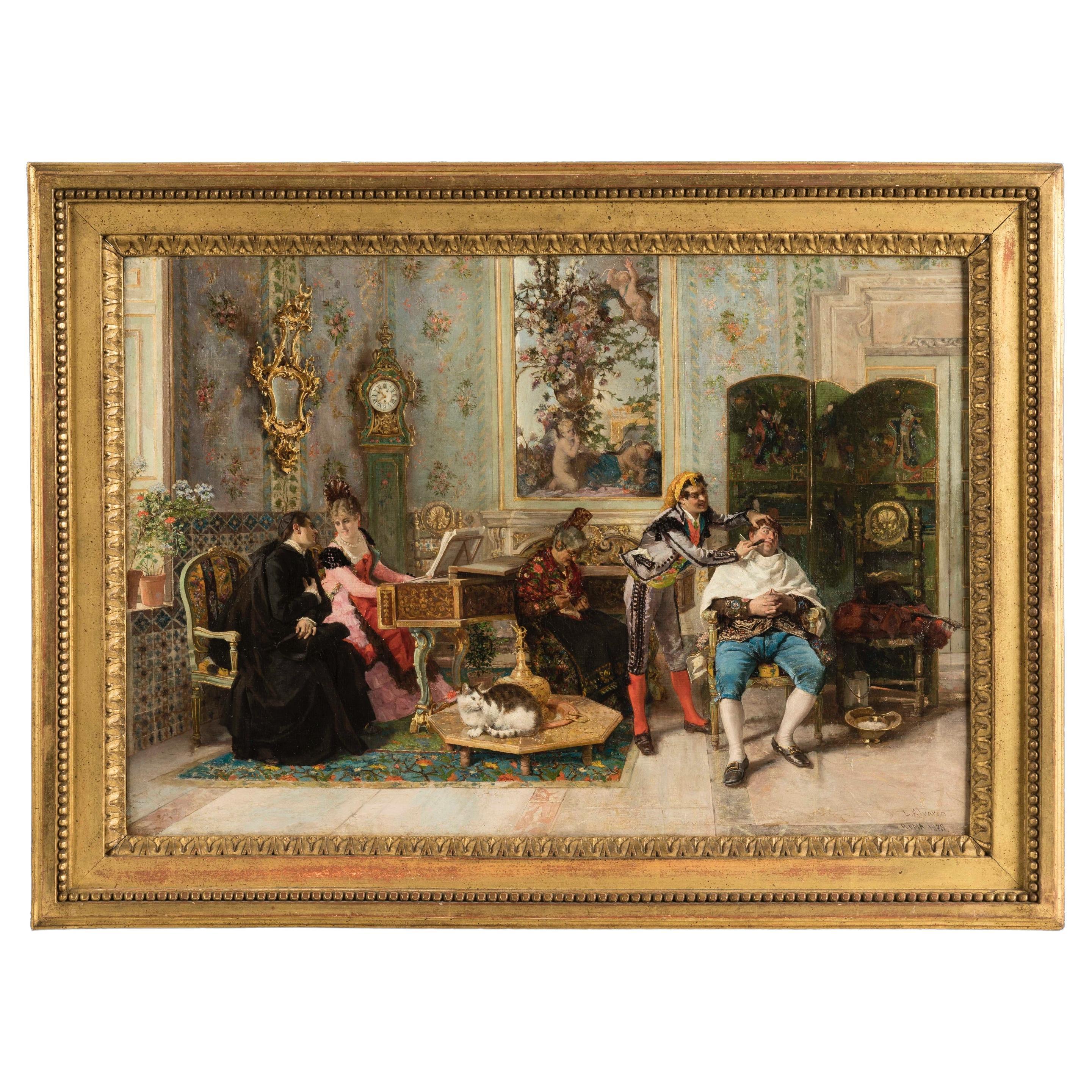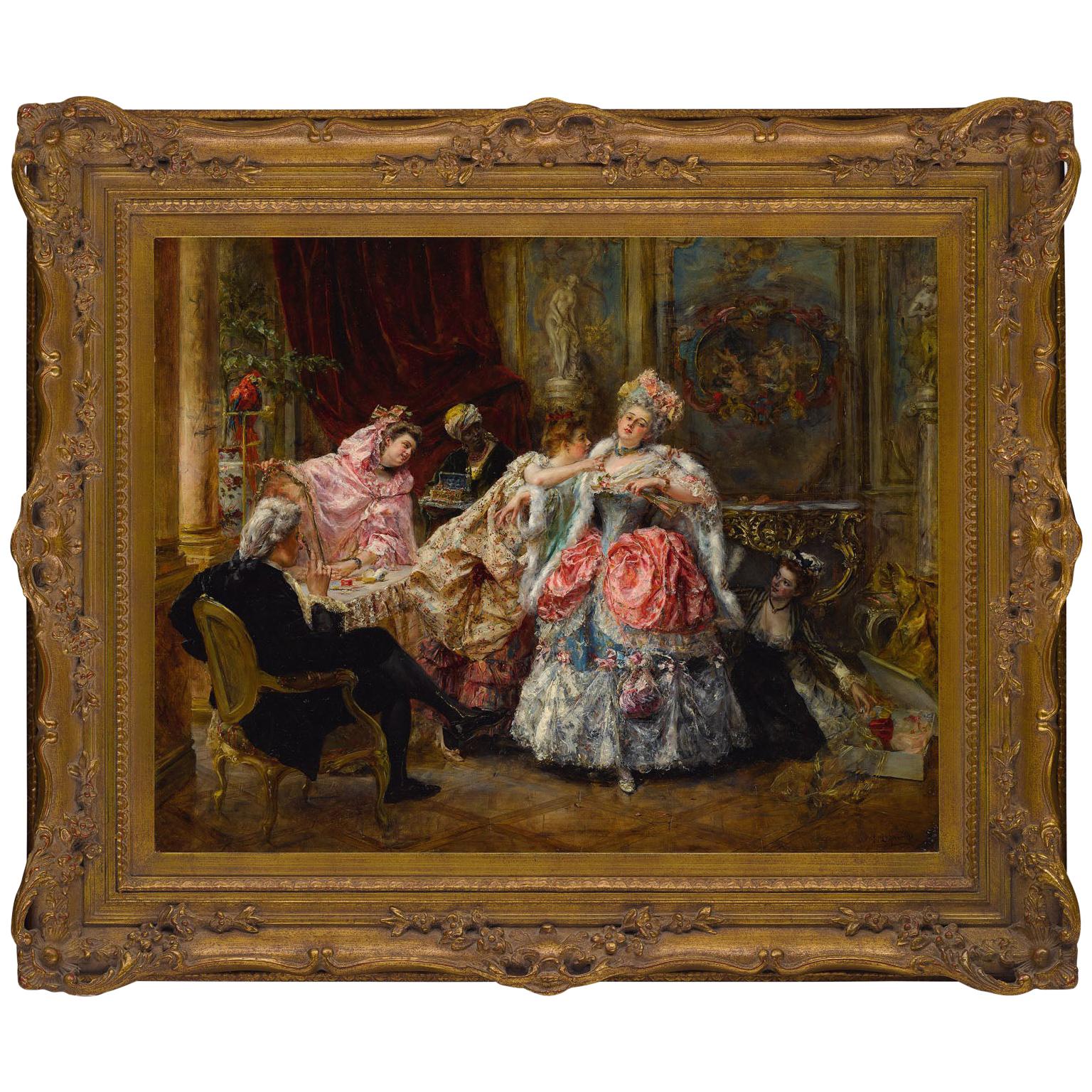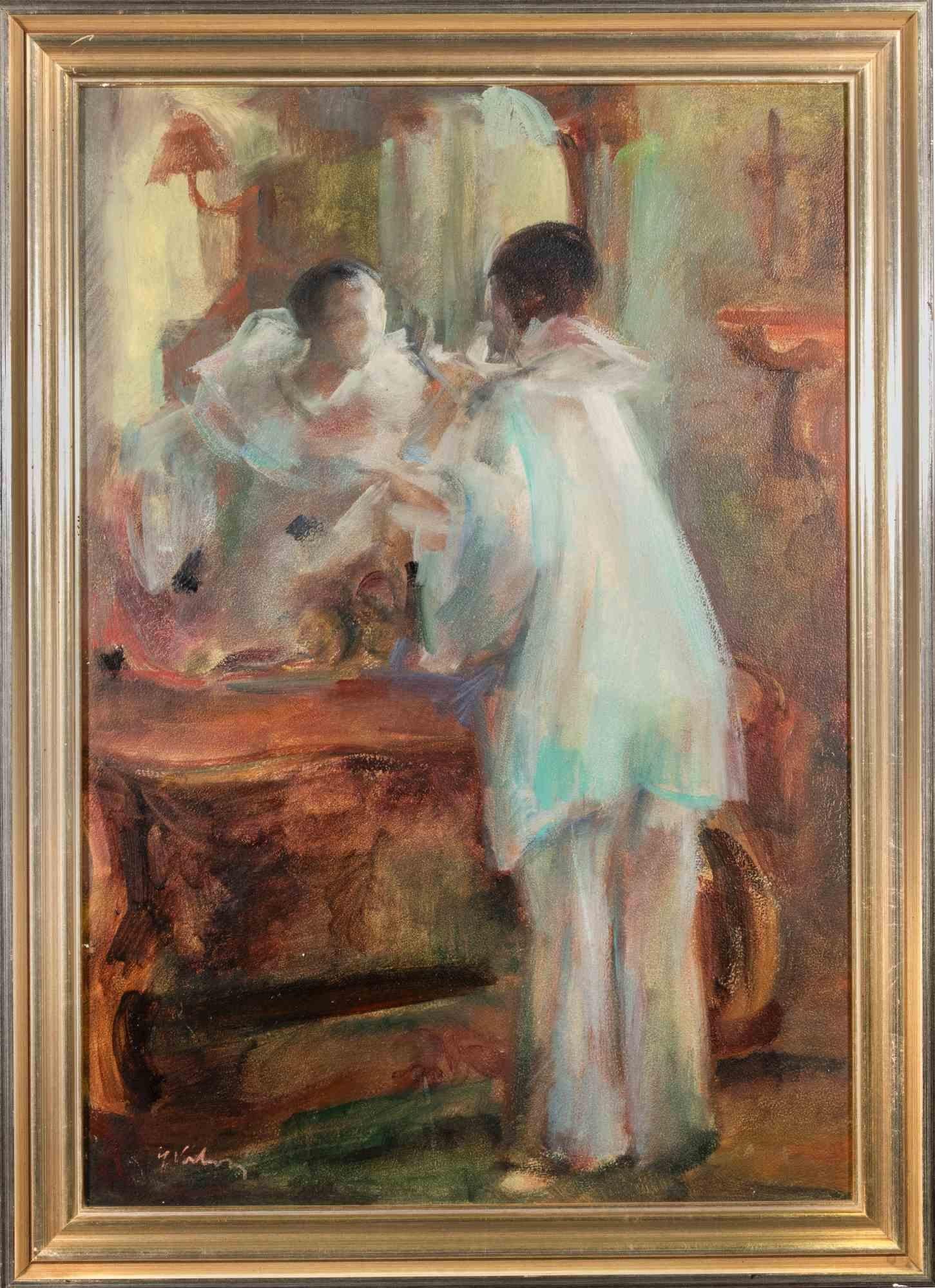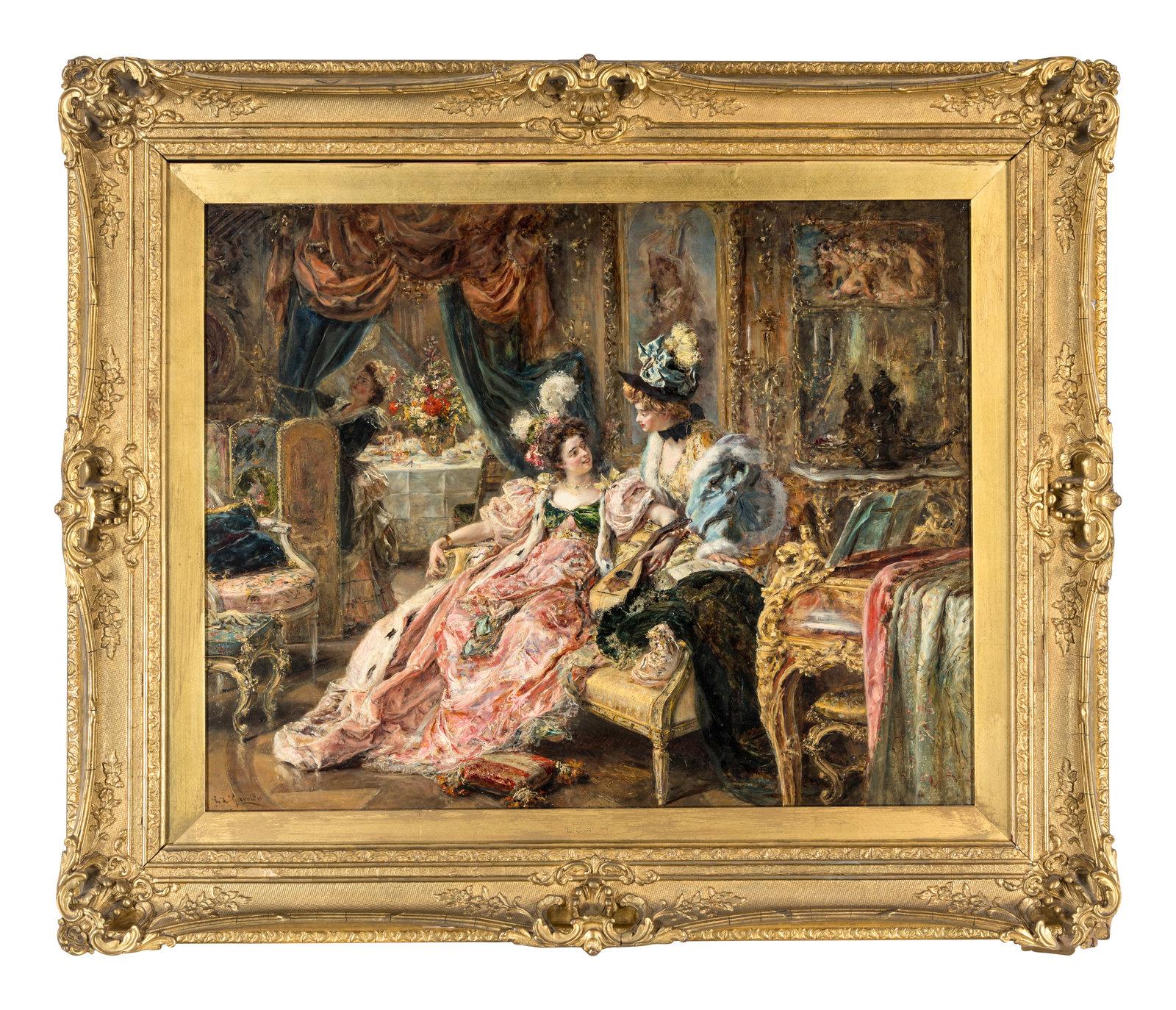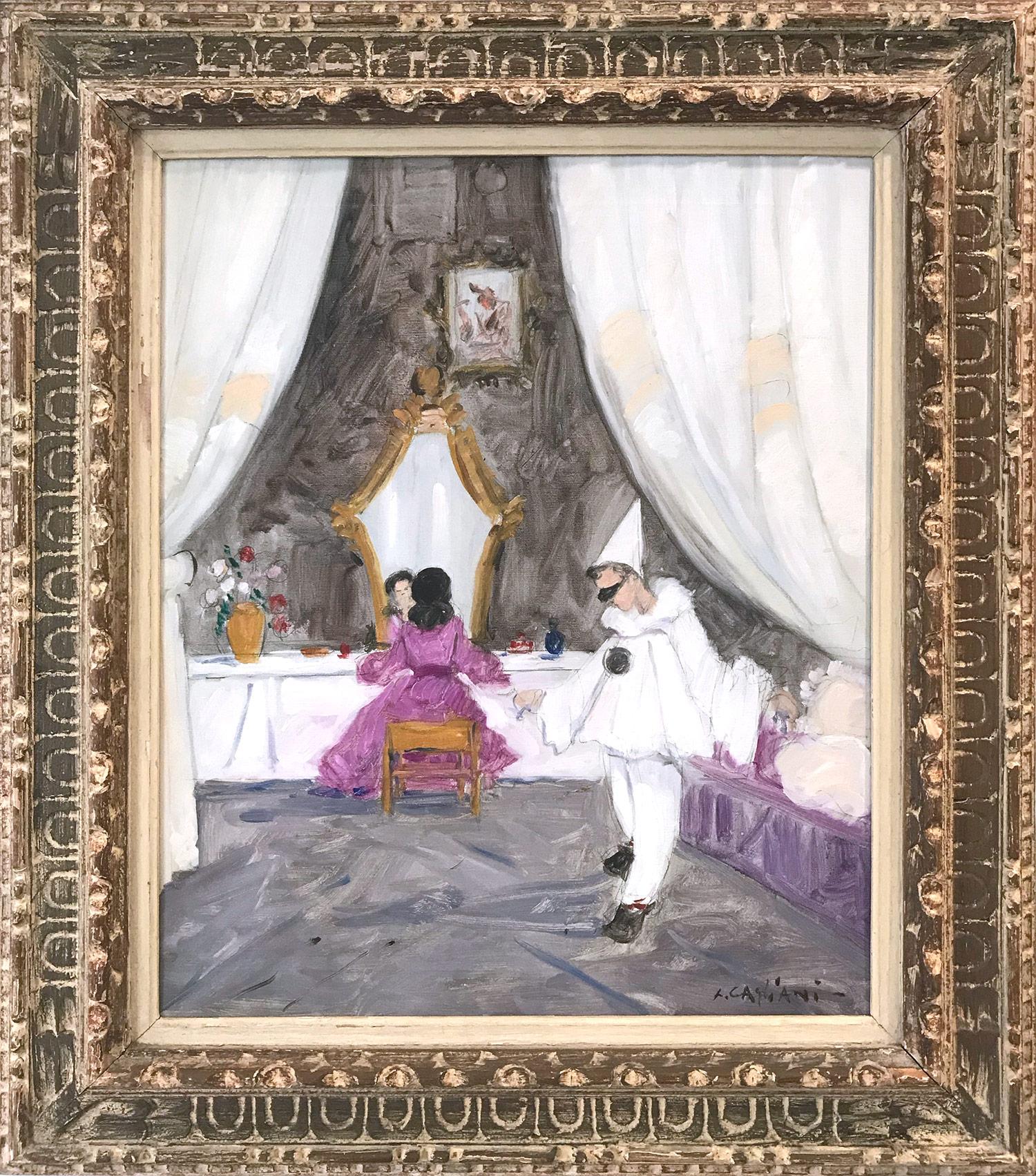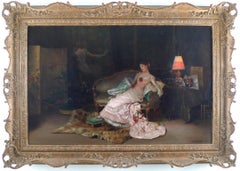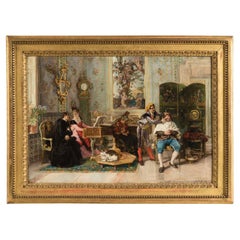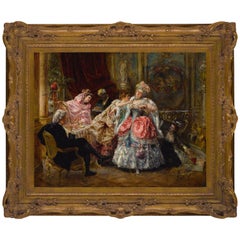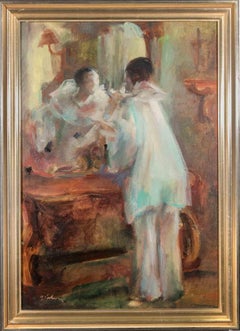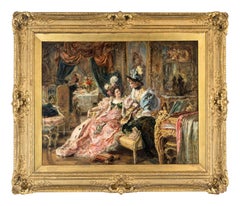Items Similar to "The Barber of Seville", Early 20th Century Oil on Canvas by José Villegas
Want more images or videos?
Request additional images or videos from the seller
1 of 11
José Villegas"The Barber of Seville", Early 20th Century Oil on Canvas by José Villegas1913
1913
$9,543.29
£7,055.48
€8,000
CA$13,126.65
A$14,591.09
CHF 7,648.34
MX$178,192.51
NOK 95,485.07
SEK 89,833.64
DKK 60,903.87
About the Item
JOSÉ VILLEGAS CORDERO
Spanish, 1844 - 1921
THE BARBER OF SEVILLE
signed & dated "J. Villegas. / Junio 1913." (lower left)
oil on canvas
19-3/8 x 28-3/4 inches (49 x 73 cm.)
framed: 27-1/2 x 36-3/4 inches (69.5 x 93 cm.)
PROVENANCE
Private Collector, Seville, Spain
José Villegas Cordero (Seville, August 26, 1844-Madrid, November 9, 1921) was a Spanish painter. He directed the Prado Museum between 1901 and 1918.
He was the brother of the painter Ricardo Villegas Cordero. He began his apprenticeship very young with José María Romero, with whom he remained for two years until entering the School of Fine Arts in Seville, where he was under the tutelage of Eduardo Cano.
In 1860, when he was only 16 years old, he sold his work Little Philosophy for 2,000 reais at the Seville Exhibition. In 1867 he traveled to Madrid, where he entered Federico Madrazo's studio. There he established friendship with painters Eduardo Rosales and Fortuny.
He went regularly to the Prado where he copied Velázquez, from whom he acquired spontaneity and the use of color for his technique.
Finally, and out of admiration for Fortuny's orientalist painting, he returned to Seville and organized an excursion to Morocco.
At the end of 1868 he decided to travel to Rome accompanied by the painters Rafael Peralta and Luis Jiménez Aranda, where he ended up entering Rosales' workshop.
His first works in the Eternal City have a costumbrista tint, which is also a highly demanded theme by the public. Proof of this are his works Improvised Toilet, Bullfighters in the Plaza Chapel (1871) and The Rest of the Gang (1873), among others.
Orientalist themes were also demanded of him, which Villegas was able to masterfully carry out thanks to the sketches he had treasured in Morocco, as well as certain works of "genre painting". In the mid-1970s he returned to Seville and took the opportunity to visit Morocco again.
Again in Rome, he picked up the witness from Fortuny and thus became the best-regarded and most sought-after painter in the city. In these times, the paintings of costumbrista and also orientalist themes exploited. Some of his works could be seen in Seville thanks to regional exhibitions and in Madrid thanks to the Bosch and Hernández galleries.
In 1878, the Senate commissioned him a canvas with a historical theme that should be about Hernán Cortés's interview with Moctezuma. In 1882 the Senate withdrew the commission, but Villegas had already been interested in historical painting and embarked on works such as La paz de Cambray and Don Juan de Austria's last visit to Felipe II, all of them of excellent workmanship.
From 1877 on, he frequently resided in Venice, where he fed on his views to set pictures such as The Feast of Marys and The Redeemer's Procession. It also exploited at this time themes inspired by the Italian Renaissance, such as Venetian Lady of the 16th century, Doge Moncenigo and Palace of the Venetian Republic among others. Many of the works conceived in this period ended up not only in Europe, but in the collections of great North American millionaires, all of them reaching astronomical prices. The economic bonanza allowed Villegas to build a villa-studio in Rome, with a fantastic Moorish aesthetic; which unfortunately would be demolished in the 1950s.
Well into the 1980s, a Dutch publisher suggested that he illustrate with Francisco Pradilla and other famous painters from all over Europe a Great Bible. Villegas took over passages related to Isaiah's prophecies.
The decade of the 90's passed calmly for the painter, who then exploited representations of ecclesiastical characters (The Cardinal Penitentiary, 1891) as well as the ever-present costumbrista theme (El día de Ramos, 1891). His renowned painting The Death of the Bullfighter, sold for 100,000 pesetas, belongs to this period.
In 1898 Villegas was granted the position of director of the Academy of Spain in Rome, held until then by Alejo Vera. He makes vigorous use of his post, demanding rigor in the exercises, the application of the pensioner and the obligatory nature of a stay in Paris.
In 1901 he was appointed director of the Prado Museum, so he left his Roman study house and moved his residence to Madrid. He would resign from office in 1918, following the theft of several pieces of the Dolphin Treasure by a museum employee. The portraits of Alfonso XIII (1902) and Pastora Imperio (1913) are from this period.
In 1914 he concluded a singular series of twelve paintings titled Decalogue, which deal with the ten commandments plus a prologue and an epilogue; Declared a Site of Cultural Interest by the Ministry of Culture of the Junta de Andalucía in 1992.
His subjects are very varied: historical, traditional and anecdotal. His brushstroke is loose and spontaneous. Among his influences are Fortuny, Madrazo and Eduardo Rosales. Sergio Carnicer was a great friend.
- Creator:José Villegas (1844 - 1921)
- Creation Year:1913
- Dimensions:Height: 19.3 in (49 cm)Width: 28.75 in (73 cm)
- More Editions & Sizes:49 x 73 cm.Price: $9,543
- Medium:
- Movement & Style:
- Period:
- Condition:
- Gallery Location:Madrid, ES
- Reference Number:1stDibs: LU1281110435592
About the Seller
5.0
Vetted Professional Seller
Every seller passes strict standards for authenticity and reliability
Established in 1977
1stDibs seller since 2019
21 sales on 1stDibs
Typical response time: 2 hours
- ShippingRetrieving quote...Shipping from: Madrid, Spain
- Return Policy
Authenticity Guarantee
In the unlikely event there’s an issue with an item’s authenticity, contact us within 1 year for a full refund. DetailsMoney-Back Guarantee
If your item is not as described, is damaged in transit, or does not arrive, contact us within 7 days for a full refund. Details24-Hour Cancellation
You have a 24-hour grace period in which to reconsider your purchase, with no questions asked.Vetted Professional Sellers
Our world-class sellers must adhere to strict standards for service and quality, maintaining the integrity of our listings.Price-Match Guarantee
If you find that a seller listed the same item for a lower price elsewhere, we’ll match it.Trusted Global Delivery
Our best-in-class carrier network provides specialized shipping options worldwide, including custom delivery.More From This Seller
View All"The Painter and his Model", 19th C. Oil on Mahogany Wood Panel by E. L. Garrido
By Eduardo Leon Garrido
Located in Madrid, ES
EDUARDO LEÓN GARRIDO
Spanish, 1856- 1949
THE PAINTER AND HIS MODEL
signed "E. L Garrido" (lower right)
oil on mahogany wood panel
19-3/4 x 24-1/8 inches (50 x 61 cm.)
framed: 28-1/2 x 32-3/4 inches (72 x 83 cm.)
PROVENANCE
Private Spanish Collector
Eduardo León Garrido (Madrid, 1856 - Caen, 1949) was a Spanish painter. He began his training at the Higher School of Painting in Madrid and as a disciple in Vicente Palmaroli...
Category
Early 1900s Realist Figurative Paintings
Materials
Oil, Wood Panel
Eduardo León Garrido, "An Elegant Dance", 19th C. Oil on Mahogany Wood Panel
By Eduardo Leon Garrido
Located in Madrid, ES
EDUARDO LEÓN GARRIDO
Spanish, 1856- 1949
AN ELEGANT DANCE
signed "E. L Garrido" (lower right)
oil on mahogany wood panel
25-1/8 x 32 inches (63.5 x 81 cm.)
framed: 31 x 38 inches (78.5 x 96 cm.)
PROVENANCE
Private Spanish Collector
Eduardo León Garrido (Madrid, 1856 - Caen, 1949) was a Spanish painter. He began his training at the Higher School of Painting in Madrid and as a disciple in Vicente...
Category
1890s Realist Figurative Paintings
Materials
Oil, Wood Panel
"A Reverie During The Ball", 19th Century Oil on Canvas by Rogelio Egusquiza
By Rogelio de Egusquiza y Barrena
Located in Madrid, ES
ROGELIO DE EGUSQUIZA
Spanish, 1845 - 1915
A REVERIE DURING THE BALL
signed and dated "Rogelio Egusquiza, 1879" (lower right)
oil on canvas
21-3/4 X 3...
Category
1870s Symbolist Figurative Paintings
Materials
Canvas, Oil
The Cardinal's Visit
Located in Madrid, ES
SALVADOR SÁNCHEZ BARBUDO
Spanish, 1857 - 1917
THE CARDINAL'S VISIT
signed, located and dated "Barbudo / ROMA 1902" (lower right)
oil on canvas
22 x 33-2/3 inches (55.5 x 85.5 cm.)
framed: 36-1/2 x 48-1/4 inches (92.5 x 122.5 cm.)
PROVENANCE
Private Collection, Munich
LITERATURE
Visita con el cardenal combines the two most salient characteristics of Sánchez-Barbudo's work: the search for novelty of theme and narrative content, and the use of minutely detailed brushwork and luminosity. Sánchez-Barbudo specialised in elaborate 'costume pictures', delighting the viewer with impressive details finely rendered with dazzling technical virtuosity.
Here, Sánchez-Barbudo depicts a well-to-do bourgeois family receiving a cardinal in their home. The interior, sumptuously furnished in the rococo style, along with the rich costumes and fabrics, are beautifully observed. Yet beyond the high technique lavished upon the composition, the treatment is comic and full of character and suffused with a gently satirising anti-clericalism.
The cardinal, far from getting the attention he expects, is, literally, sidelined, his expression and body language showing his pique. There is no doubt that contemporary collectors and spectators took pleasure in the sight of noble self-respecting figureheads of the church being brought back down to earth. The comedy was appealing, and the message suited the prevailing political mood of an increasingly secular middle-class buying public.
Salvador Sánchez Barbudo was born on March 14, 1857 in Jerez de la Frontera (Cádiz). He was one of the most important Spanish artists of the "casacón" genre, who followed the Fortuny tradition in Rome. During his childhood he was under the protection of the Marquis del Castillo and in 1875 he moved to Seville where he attended the School of Fine Arts, becoming a disciple of José Villegas...
Category
Early 1900s Realist Figurative Paintings
Materials
Canvas, Oil
"Playing hide and seek", 19th Century Oil on Panel by Vicente Palmaroli, Spanish
Located in Madrid, ES
VICNTE PALMAROLI y GONZÁLEZ
Spanish, 1834 - 1896
PLAYING HIDE AND SEEK
signed "V. Palmaroli" (lower right)
oil on mahogany panel
17-3/4 x 13-1/2 inches (45 X 34 cm.)
framed: 25-1/4 X 21-1/4 inches (64 X 53.7 cm.)
PROVENANCE
Leslie Hindman Inc., Auctionners
Private Collector, Madrid
Oil on table by Vicente Palmaroli...
Category
Late 19th Century Romantic Interior Paintings
Materials
Oil, Wood Panel
"Conversando", 19th Century Oil on Canvas by Artsit Ángel María Cortellini
Located in Madrid, ES
ÁNGEL MARÍA CORTELLINI
Spanish, 1819 - 1887
CONVERSANDO
signed "Cortellini" (lower right)
oil on canvas
13-1/4 x 11 inches (33.5 x 28 cm.)
framed: 17-1/4 x 15 (44 x 38 cm.)
Ángel María Cortellini. Sanlúcar de Barrameda (Cádiz), 27.09.1819 – Madrid, 1887. Painter.
Ángel María Cortellini was born in Sanlúcar de Barrameda on September 27, 1819, to an Italian father and a Spanish and Sanlúcar mother. Contrary to family opinion, he decided to dedicate himself to painting and already, at the age of nine, he was enrolled in a drawing academy in his hometown. They soon sent him to Seville, where he was a disciple of Joaquín Domínguez Bécquer...
Category
19th Century Romantic Figurative Paintings
Materials
Canvas, Oil
You May Also Like
Oil on Canvas painting of 'The Barber of Seville' by Luis Alvarez Catalá
Located in London, GB
The Barber of Seville
By Luis Alvarez Catalá
Executed in oil on canvas, housed in a giltwood frame, the painting depicting an 18th century domesti...
Category
Antique 19th Century Italian Paintings
Materials
Paint
Eduardo León Garrido (Spanish, 1856-1949) Oil on Panel "Dressing for the Ball"
By Eduardo Leon Garrido
Located in Los Angeles, CA
Eduardo León Garrido (Spanish, 1856-1949) A very Fine oil on panel "Dressing for the Ball" depicting 18th century interior scene of a young 'High Society' maiden getting dressed for ...
Category
Antique Early 1900s Spanish Rococo Paintings
Materials
Wood, Paint
Pierot in the Dressing Room - Oil on Canvas by Vrbova Miloslav- Mid-20th Century
Located in Roma, IT
Pierot in the dressing room is an oil painting realized by Vrbova Miloslava Prof. Zinkovy.
Oil on panel, 65 x 45 cm.
Hand signed lower margin.
Good conditions
Category
Mid-20th Century Modern Figurative Paintings
Materials
Oil, Canvas
"A Surprising Visit" 19th Century Antique European Oil Painting on Canvas
By Eduardo Leon Garrido
Located in Jacksonville, FL
A Surprising Visit" by Eduardo León Garrido (Spanish, 1856-1949) invites viewers into a sumptuous journey through 19th-century European luxury. Eduardo León Garrido, a distinguished Spanish artist born in 1856 and leaving an artistic legacy until 1949, displayed a remarkable ability to capture the essence of his time through his brushstrokes.
This antique masterpiece, rendered in oil on panel and measuring 22 1/2 x 29 3/4 inches, unveils a world of opulence within a Royal European...
Category
19th Century Academic Interior Paintings
Materials
Oil, Canvas
"Venetian Powder Room Scene with Figures" Impressionist Oil Painting on Canvas
By Luigi Cagliani
Located in New York, NY
A whimsical oil painting depicting a Venetian Powder Room Scene with Figures getting ready for the masquerade. A truly intimate scene with a ornate mirror, flowers in a vase and whit...
Category
Early 20th Century Impressionist Interior Paintings
Materials
Canvas, Oil
Richard Geiger Large Oil on Canvas Master Painting Scene, Commedia Dell’arte
Located in Vero Beach, FL
Richard Geiger Large Oil on Canvas Master Painting Scene of the Commedia dell’arte.
The Commedia dell’arte is an early form of theater in Italy. Various performers in the troupe w...
Category
Vintage 1920s Austrian Belle Époque Paintings
Materials
Canvas
More Ways To Browse
Genre Paintings 20th Century
Paintings Early 20th Century Venice
Dutch Painting Early 20th Century
Antique Barber
Seville Art
Seville Spain
Art By Barber
Oil Painting Cardinal
16th Century Renaissance Paintings
Fortuny Paintings
16th Century Venetian
Prado Museum
Portrait Of A Cardinal
Portrait 16th Century Oil
Toilet Art
Portrait Of A Lady Spain
Cortes Oil
Paintings By Cortes
